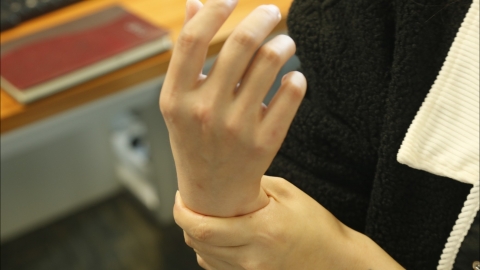Why do my fingers become numb after holding my arm raised for a while?
Generally, numbness in the fingers after raising the arm for a short period may be caused by nerve compression due to posture, impaired blood circulation, carpal tunnel syndrome, cervical spondylosis, or diabetic peripheral neuropathy. It is recommended to seek medical attention promptly, identify the underlying cause, and receive symptomatic treatment under a doctor's guidance. Specific analyses are as follows:

1. Nerve compression from posture: When the arm is raised, nerves in the arm may become over-stretched or compressed, disrupting nerve conduction and causing finger numbness. Lowering the arm and adjusting posture, while avoiding prolonged elevation, usually allows the numbness to gradually subside.
2. Impaired blood circulation: Raising the arm can hinder venous blood return, leading to insufficient blood supply to the hand and resulting in finger numbness. Performing gentle arm movements—such as clenching fists and stretching fingers—can promote blood flow and alleviate the numbness.
3. Carpal tunnel syndrome: This condition results from compression of the median nerve within the carpal tunnel. Raising the arm may exacerbate this compression, causing numbness, often accompanied by pain and weakness in the fingers. Patients may take medications such as mecobalamin tablets, vitamin B1 tablets, or ibuprofen sustained-release capsules as prescribed. In some cases, surgical decompression via carpal tunnel release may be necessary.
4. Cervical spondylosis: Herniated cervical discs or similar conditions can compress nerve roots. Arm elevation may worsen nerve compression, leading to finger numbness, possibly accompanied by neck and shoulder pain. Medications such as celecoxib capsules, eperisone hydrochloride tablets, or mecobalamin dispersible tablets may be used as directed. Surgical options like anterior cervical discectomy and fusion (ACDF) can also help relieve nerve compression.
5. Diabetic peripheral neuropathy: Prolonged high blood glucose damages peripheral nerves. Elevating the arm may trigger or worsen finger numbness, often accompanied by reduced sensation. Patients should take medications such as metformin sustained-release tablets, glimepiride tablets, or epalrestat tablets as prescribed, while maintaining strict glycemic control to slow the progression of nerve damage.
In daily life, avoid maintaining the same posture for extended periods and perform regular stretching exercises for the arms and neck. Monitor blood glucose levels carefully and undergo routine health check-ups to detect and address potential health issues early.




